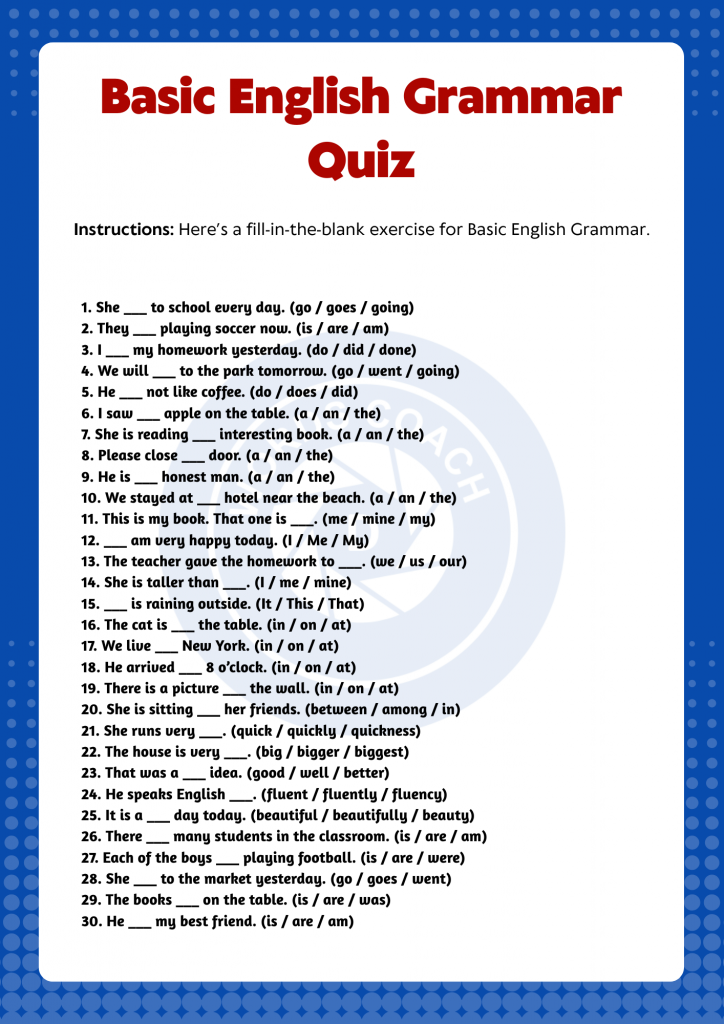Basic English Grammar Quiz
What is Basic English Grammar?
Basic English Grammar is the set of fundamental rules and principles that explain how words, phrases, and sentences are formed in English. It acts like a guidebook that helps speakers and writers arrange words in the right order, use them correctly, and communicate clearly. Without grammar, sentences would be confusing and hard to understand.
At the most basic level, English grammar is built on the following elements:
Parts of Speech
Every word in English belongs to a category, such as nouns (names of people, places, things), pronouns (he, she, it), verbs (actions or states), adjectives (describing words), adverbs (how actions happen), prepositions (in, on, at), conjunctions (and, but, because), and interjections (wow, oh, hey). Knowing these categories makes it easier to understand how words function in a sentence.
Sentence Structure
A simple sentence usually has a subject (the doer of the action) and a verb (the action or state). For example, She runs. As grammar becomes more complex, sentences can also include objects, complements, and modifiers.
Verb Tenses
Tenses show the time of an action: past (I walked), present (I walk), and future (I will walk). They also show whether an action is completed, ongoing, or repeated.
Articles and Determiners
Words like a, an, the and this, that, these, those help specify whether we are talking about something general or specific.
Singular and Plural Forms
Grammar tells us how to change words depending on whether we are talking about one item (cat) or more than one (cats).
Questions and Negatives
English grammar has clear rules for forming questions (Do you like pizza?) and negatives (I don’t like pizza.).
Agreement
Subjects and verbs must match in number. For example, He plays (singular) vs. They play (plural).
Modifiers
Adjectives and adverbs are used to add detail. For example, The red car drives quickly.
Basic English Grammar Exercise
Here’s a 30-question Basic English Grammar Fill-in-the-Blank Exercise.
- She ______ to school every day. (go / goes / going)
- They ______ playing soccer now. (is / are / am)
- I ______ my homework yesterday. (do / did / done)
- We will ______ to the park tomorrow. (go / went / going)
- He ______ not like coffee. (do / does / did)
- I saw ______ apple on the table. (a / an / the)
- She is reading ______ interesting book. (a / an / the)
- Please close ______ door. (a / an / the)
- He is ______ honest man. (a / an / the)
- We stayed at ______ hotel near the beach. (a / an / the)
- This is my book. That one is ______. (me / mine / my)
- ______ am very happy today. (I / Me / My)
- The teacher gave the homework to ______. (we / us / our)
- She is taller than ______. (I / me / mine)
- ______ is raining outside. (It / This / That)
- The cat is ______ the table. (in / on / at)
- We live ______ New York. (in / on / at)
- He arrived ______ 8 o’clock. (in / on / at)
- There is a picture ______ the wall. (in / on / at)
- She is sitting ______ her friends. (between / among / in)
- She runs very ______. (quick / quickly / quickness)
- The house is very ______. (big / bigger / biggest)
- That was a ______ idea. (good / well / better)
- He speaks English ______. (fluent / fluently / fluency)
- It is a ______ day today. (beautiful / beautifully / beauty)
- There ______ many students in the classroom. (is / are / am)
- Each of the boys ______ playing football. (is / are / were)
- She ______ to the market yesterday. (go / goes / went)
- The books ______ on the table. (is / are / was)
- He ______ my best friend. (is / are / am)





